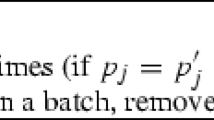Abstract
In this paper we consider the scheduling problem with parallel-batching machines from a game theoretic perspective. There are m parallel-batching machines each of which can handle up to b jobs simultaneously as a batch. The processing time of a batch is the time required for processing the longest job in the batch, and all the jobs in a batch start and complete at the same time. There are n jobs. Each job is owned by a rational and selfish agent and its individual cost is the completion time of its job. The social cost is the largest completion time over all jobs, the makespan. We design a coordination mechanism for the scheduling game problem. We discuss the existence of pure Nash Equilibria and offer upper and lower bounds on the price of anarchy of the coordination mechanism. We show that the mechanism has a price of anarchy no more than \(2-\frac{2}{3b}-\frac{1}{3\max \{m,b\}}\).
Similar content being viewed by others
References
Aspnes J, Azar Y, Fiat A, Plotkin SA, Waarts O (1997) On-line routing of virtual circuits with applications to load balancing and machine scheduling. J ACM 44(3):486–504
Awerbuch B, Azar Y, Richter Y, Tsur D (2006) Tradeoffs in worst-case equilibria. Theor Comput Sci 361(2–3):200–209
Azar Y, Jain K, Mirrokni VS (2008) (Almost) optimal coordination mechanisms for unrelated machine scheduling. In: Proceedings of the 19th annual ACM-SIAM symposium on discrete algorithms, SODA, pp 323-332
Azar Y, Naor J, Rom R (1995) The competitiveness of on-line assignments. J Algorithms 18(2):221–237
Cho Y, Sahni S (1980) Bounds for list schedules on uniform processors. SIAM J Comput 9:91–103
Christodoulou G, Koutsoupias E, Nanavati A (2009) Coordination mechanisms. Theor Comput Sci 410(36):3327–3336
Czumaj A, Vocking B (2007) Tight bounds for worst-case equilibria. ACM Trans Algorithms (TALG) 3(1):1–17
Deng X, Poon CK, Zhang Y (2003) Approximation algorithms in batching processing. J Comb Optim 7:247–257
Dobson G (1984) Scheduling independent tasks on uniform processors. SIAM J Comput 13:716–721
Durr C, Thang NK (2011) Non-clairvoyant scheduling games. Theory Comput Syst 49(1):3–23
Finn G, Horowitz E (1979) A linear time approximation algorithm for multiprocessor scheduling. BIT 19:312–320
Friesen DK (1987) Tighter bounds for LPT scheduling on uniform processors. SIAM J Comput 16:554–560
Gairing M, Lucking T, Mavronicolas M, Monien B (2004) Computing nash equilibria for scheduling on restricted parallel links. In: STOC, pp 613-622
Graham RL (1969) Bounds on multiprocessing timing anomalies. SIAM J Appl Math 45:416–429
Graham RL, Lawler EL, Lenstra JK, Rinnooy Kan AHG (1979) Optimization and approximation in deterministic sequencing andscheduling: a survey. Ann Discrete Math 5(2):287–326
Ibarra OH, Kim CE (1997) Huristic algorithms for scheduling independent tasks on nonidentical processors. J ACM 24:280–289
Immorlica N, Li L, Mirrokni VS, Schulz A (2009) Coordination mechanisms for selfish scheduling. Theor Comput Sci 410:1589–1598
Koutsoupias E, Papadimitriou C (2009) Worst-case equilibria. Comput Sci Rev 3(2):65–69
Lageweg BJ, Lawler EL, Lenstra JK, Rinnooy Kan AHG (1981) Computer aided complexity classification of deterministic scheduling problems. Research report BW138/81, Mathematisch Centrum, Amsterdam
Lee CY, Uzsoy R, Martin Vega LA (1992) Efficient algorithms for scheduling semiconductor burn-in operations. Oper Res 40:764–775
Lee CY, Uzsoy R (1999) Minimizing makespan on a single batch processing machine with dynamic job arrivals. Int J Prod Res 37:219–236
Ng CT, Cheng TCE, Yuan JJ (2003) The single machine batching problem with family setup times to minimize maximum lateness is strongly \(NP\)-hard. J Sched 6:483–490
Potts CN, Kovalyov MY (2000) Scheduling with batching: a review. Eur J Oper Res 120:228–249
Schuurman P, Vredeveld T (2007) Performance guarantees of local search for multiprocessor scheduling. INFORMS J Comput 19:52–63
Uzsoy R (1994) A single batch processing machine with non-identical job sizes. Int J Prod Res 32:1615–1635
Zhang G, Cai X, Wong CK (2001) On-line algorithms for minimizing makespan on batch processing machines. Nav Res Logist 48:241–258
Acknowledgments
This research was supported in part by the National Natural Science Foundation of China under Grant Numbers 11201439 and 11271341. This work was also supported in part by the Shandong Provincial Natural Science Foundation, China, under Grant Number ZR2012AQ12 and by the Doctoral Fund of Ministry of Education of China (20120132120001).
Author information
Authors and Affiliations
Corresponding author
Rights and permissions
About this article
Cite this article
Nong, Q.Q., Fan, G.Q. & Fang, Q.Z. A coordination mechanism for a scheduling game with parallel-batching machines. J Comb Optim 33, 567–579 (2017). https://doi.org/10.1007/s10878-015-9980-9
Published:
Issue Date:
DOI: https://doi.org/10.1007/s10878-015-9980-9




